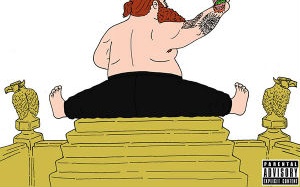{shortcode-885014511b6a92b2e8a5e951d240a14c6992a1f2}Danielle Nicole brings a fiery blues in her new album “Cry No More.” In her second studio album after 2015’s “Wolf Den,” Nicole, who originally cut her teeth with the family blues band Trampled Under Foot, takes on the album with both lead vocals and the bass. Since her days with the family band, Nicole has developed as a performer, from simpler blues melodies into more complex jams. Nicole especially shines as a bassist, incorporating funk and rock influenced blues bass lines and bold instrumental choices.
In terms of lyrics and themes, however, the album does leave some room for improvement. The album is far from unique. Danielle Nicole says on her website, “I think that people want to hear authentic music again.” This is a ludicrous claim, considering that every track on “Cry No More” other than “Poison the Well” is largely derivative of previous blues recordings in musical, lyrical, and production choices, as theft is nearly an instrument in and of itself within the blues genre. It is in this spirit of building on the work of previous blues artists that Nicole’s sophomore album as a solo performer is a success, yet in the spirit of innovation and creative divergence, it fails.
“Cry No More,” while ostensibly a capital ‘B’ blues album, draws from many other uniquely American musical traditions. Tracks such as “Someday You Might Change Your Mind,” “Save Me,” and “How Come You Don’t Call Me Anymore” are heavily steeped in southern rock, from steady rhythmic drums to a church organ. Blues music has always been heavily influenced by the geography of its musicians and listeners: From the sparse syncopated Mississippi delta blues, to the crunchy electric blues of Chicago, American blues music has always served as a reflection of local style and swagger. Nicole’s blues is no exception. She has been influenced by contemporaries in a swath of genres including southern rock, soft rock, hard rock, and americana. The album’s seventh track, “Bobby,” brings a certain old-timey americana charm to the otherwise fiery album. Filled with softer strumming patterns, minimal drums, finger plucked strings, and some good old country vocals, “Bobby” injects a wave of cool into generally hot-tempered lyrical and instrumental choices on the album. Just as Nicole is influenced by genres outside of blues, she is equally beholden to those blues greats who have come before her in the American blues tradition. The album’s second track, “I’m Going Home,” pays homage to Robert Johnson’s iconic blues masterpiece, “Cross Road Blues,” with the opening line, “Leave me at the crossroads, tears in my eye.” Overall, Nicole blends styles both old and new throughout the album in an admirable attempt at “authentic” music.
Although “Cry No More” may not be an album that alters or even effects the course of blues music as a whole, it is nonetheless a solid contribution to the field, and an enjoyable listen. Danielle Nicole has succeeded not as a visionary, but as a proficient and passionate practitioner of the great American blues tradition.
Read more in Arts
The King of Soul in the Twenty-First Century: Otis Redding and The Dock of the Bay 50 Years LaterRecommended Articles
-
Scott Weiland Offers his Version of Heroin ChicSCOTT WEILAND 12 Bar Blues Atlantic Records It's just so easy to hate Scott Weiland. Right as Pearl Jam decided
-
The Crimson SupplementT he year 1971 witnessed the arrival of surprisingly few new superstars. Heroes from the days of psychedelic idolatry--the Airplane,
-
1922 CLASS DAY SPREAD COMMITTEE ANNOUNCES ENTERTAINMENT PLANSThe 1922 Class Day Spread Committee has announced that Saturday, June 10, will be the last day for receiving applications
-
 'Mr. Wonderful' A Flamboyant and Fun Debut
'Mr. Wonderful' A Flamboyant and Fun Debut -
 Garbage Almost as Cool as It's Been
Garbage Almost as Cool as It's Been













